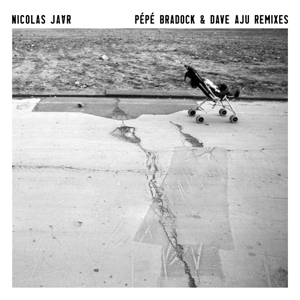Nicolas Jaar Remixes Vol.1
With Nicolas Jaar’s debut LP, Space Is Only Noise, still standing as one of the […]

With Nicolas Jaar’s debut LP, Space Is Only Noise, still standing as one of the year’s most provocative and inventive takes on dance music—admittedly, the term is being used loosely here—it was only a matter of time before someone would be tapped to bring his songs just a little closer to the dancefloor. Fortunately, Circus Company has enlisted two like-minded producers, France’s Pépé Bradock and San Francisco’s Dave Aju, to reimagine two of the album’s tracks with the same sense of adventurous exploration originally displayed by Jaar himself.
Prolific French-house stalwart Pe?pe Bradock, apparently energized by a chance to remix a young contemporary or perhaps overwhelmed as to which direction to venture, delivers no less than three reinterpretations of Jaar’s dramatic “Too Many Kids Finding Rain In the Dust,” the first two of which fall in step with the kind of work found on Bradock’s comprehensive 2009 remix collection Confiote De Bits. The EP’s opening track, dubbed the “Blind Pig Mix,” sees the Parisian incorporating a steady breakbeat and fusing his flair for abstract jazz into the ghostly guitar and vocals of the original, while his second contribution, referred to as “Train Fantome Poke,” finds Bradock in the midst of a much darker exploration, utilizing a relentless kick drum along with a collage of ominous tones to pull the remix through its six-plus minutes. The closest thing to a misstep from Bradock comes in the form the of EP’s digital-only bonus track, which marks the release’s sole attempt to make one of Jaar’s compositions more ambient. Entitled the “Mirandapella,” it’s unoffensive but also unnecessary, an effort unable to match the richness in depth and fluidity which characterized the original “Too Many Kids.”
While Bradock spreads his ideas over multiple efforts, Dave Aju has elected to focus his might into one brilliantly straight-forward rework, tackling “Space Is Only Noise If You Can See” with an expert efficiency. The California resident seems to have decided to meet Jaar a little more than halfway to his New York home, landing this remix firmly in the realm of retro-futuristic, Detroit-style techno. Using Jaar’s eerily disengaged vocal as the leader of the procession, Aju throws down a host of cold, mechanical drums and percolating background synths, all held together by a deliciously simple bassline.
One would hope that this remix collection comes with a “Volume 1” tag because there’s at least a “Volume 2”—if not a three and four—in the works. As long as they continue to bring in quality purveyors of adventurous sounds, any subsequent editions will surely be something to look forward to.

